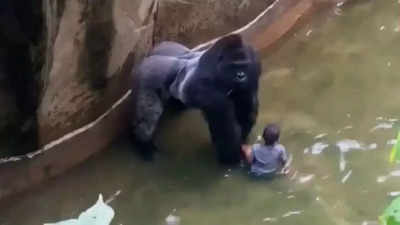Trending
Today in the past: Interesting things that happened on May 28
May 28th commemorates a diverse array of historical events, spanning from significant strides in social justice to pivotal moments in science and industry. This date marks milestones in women's rights, environmental advocacy, and technological innovation, each contributing to significantly to human history. From tragic disasters to transformative achievements, the events of May 28th are a reminders of the complexities and interconnectedness of our world.

On this day in 2016, Harambe the gorilla was tragically shot after a child fell into his enclosure. Source: Youtube
May 28th is a day rich with history, marked by a series of events that have shaped the world in various ways. From groundbreaking scientific achievements to pivotal moments in social justice, this date stands out as a significant point on the calendar. Let’s explore some of the most interesting facts about May 28th:
Menstrual Hygiene Day
Initiated to challenge the stigmas associated with menstruation, Menstrual Hygiene Day on May 28th is a call to action for global health.It is a day dedicated to promoting menstrual hygiene management (MHM) and advocating for the dignity of women and girls worldwide. The observance of this day highlights the importance of access to sanitary products, safe and hygienic spaces to manage menstruation, and the right to education about menstrual health. It is a day to recognize that menstrual hygiene is a fundamental aspect of health and human rights, and it is essential for achieving gender equality and empowering women and girls.
Cyclone in the Bay of Bengal

Sierra Club formation
The Sierra Club, established on May 28, 1892, has been foundational for the environmental movement in the United States and beyond. Founded by the visionary naturalist John Muir, the organization has been at the forefront of conservation efforts, advocating for the protection of natural landscapes and wildlife. The Sierra Club’s commitment to environmental stewardship has led to significant victories in preserving national parks, combating climate change, and promoting sustainable practices.
Jawaharlal Nehru’s cremation
On May 28, 1964, India bid farewell to its first Prime Minister, Jawaharlal Nehru, with a state funeral that saw a nation in mourning. Nehru’s cremation marked the end of an era that had been defined by his leadership in the struggle for independence and the founding years of the Republic of India. His vision for a secular, democratic, and modern India shaped the country’s trajectory and left an unforgettable mark on its political and social fabric.
Volkswagen’s foundation
On May 28, 1937, Volkswagen was founded, marking the beginning of a new chapter in automotive history. The German manufacturer set out with the vision of creating affordable and reliable vehicles for the masses, an ambition that would eventually lead to the iconic Beetle. Over the decades, Volkswagen has grown into a global powerhouse, synonymous with quality and innovation.
Dhori mine disaster
The Dhori mine disaster on May 28, 1965, is etched in the collective memory of India as one of the most harrowing industrial tragedies of the 20th century. The explosion and subsequent fire claimed the lives of 400 miners, exposing the dire working conditions and lack of safety measures prevalent in the mining industry at the time. The disaster became a catalyst for change, leading to stricter regulations and the implementation of safety protocols to protect miners.
Alan Turing’s paper
Alan Turing’s seminal paper “On Computable Numbers,” submitted on May 28, 1936, laid the theoretical foundations for modern computing. Turing’s concept of a universal machine paved the way for the development of the computer and the field of computer science. His work has had far-reaching implications, influencing not just technology but also philosophy, cognitive science, and artificial intelligence.
Birth of Vinayak Damodar Savarkar
Vinayak Damodar Savarkar, born on May 28, 1883, was a pivotal figure in India’s fight for independence. His ideology of Hindutva and his role in the Hindu Mahasabha made him a controversial and influential leader. Savarkar’s vision of India was rooted in the idea of a Hindu nation, and his writings and activism played a significant role in shaping the discourse on Indian nationalism.
Greek women’s right to vote
May 28, 1952, marked a watershed moment for women’s rights in Greece as women were granted the legal right to vote. This historic achievement was the culmination of a long struggle for gender equality and represented a significant step forward for democracy in the country. The enfranchisement of women empowered them to participate fully in the political process and contributed to the shaping of modern Greek society.
Bhagwati Charan Vohra’s sacrifice
On May 28, 1930, Bhagwati Charan Vohra’s life was tragically cut short during a bomb test on the banks of the Ravi River in Lahore. A close associate of Bhagat Singh, Vohra was deeply involved in the struggle for India’s independence from British rule. His untimely death was a profound loss to the revolutionary movement, but his legacy of courage and commitment to the cause of freedom lived on. Vohra’s intellectual contributions and his role in organizing the youth for the independence movement are remembered with reverence.
Harambe the gorilla
The tragic shooting of Harambe, a gorilla at the Cincinnati Zoo, on May 28, 2016, ignited a global debate on animal rights and zoo safety protocols. The incident raised critical questions about the ethics of captivity and the responsibilities of zoos to ensure the safety of both animals and visitors. Harambe’s death sparked conversations about conservation, the role of zoos in education and research, and the complex relationship between humans and wildlife.
Menstrual Hygiene Day
Initiated to challenge the stigmas associated with menstruation, Menstrual Hygiene Day on May 28th is a call to action for global health.It is a day dedicated to promoting menstrual hygiene management (MHM) and advocating for the dignity of women and girls worldwide. The observance of this day highlights the importance of access to sanitary products, safe and hygienic spaces to manage menstruation, and the right to education about menstrual health. It is a day to recognize that menstrual hygiene is a fundamental aspect of health and human rights, and it is essential for achieving gender equality and empowering women and girls.
Cyclone in the Bay of Bengal
The Bay of Bengal cyclone of May 28, 1963, is remembered as one of the deadliest natural disasters in recorded history. With winds that swept away entire villages and caused the deaths of approximately 22,000 people, the cyclone was a grim reminder of nature’s unfathomable power. The catastrophe highlighted the urgent need for effective disaster management and preparedness in vulnerable regions. It spurred initiatives to improve early warning systems, build resilient infrastructure, and educate communities on emergency response.

Representative image
Sierra Club formation
The Sierra Club, established on May 28, 1892, has been foundational for the environmental movement in the United States and beyond. Founded by the visionary naturalist John Muir, the organization has been at the forefront of conservation efforts, advocating for the protection of natural landscapes and wildlife. The Sierra Club’s commitment to environmental stewardship has led to significant victories in preserving national parks, combating climate change, and promoting sustainable practices.
Jawaharlal Nehru’s cremation
On May 28, 1964, India bid farewell to its first Prime Minister, Jawaharlal Nehru, with a state funeral that saw a nation in mourning. Nehru’s cremation marked the end of an era that had been defined by his leadership in the struggle for independence and the founding years of the Republic of India. His vision for a secular, democratic, and modern India shaped the country’s trajectory and left an unforgettable mark on its political and social fabric.
Volkswagen’s foundation
On May 28, 1937, Volkswagen was founded, marking the beginning of a new chapter in automotive history. The German manufacturer set out with the vision of creating affordable and reliable vehicles for the masses, an ambition that would eventually lead to the iconic Beetle. Over the decades, Volkswagen has grown into a global powerhouse, synonymous with quality and innovation.
Dhori mine disaster
The Dhori mine disaster on May 28, 1965, is etched in the collective memory of India as one of the most harrowing industrial tragedies of the 20th century. The explosion and subsequent fire claimed the lives of 400 miners, exposing the dire working conditions and lack of safety measures prevalent in the mining industry at the time. The disaster became a catalyst for change, leading to stricter regulations and the implementation of safety protocols to protect miners.
Alan Turing’s paper
Alan Turing’s seminal paper “On Computable Numbers,” submitted on May 28, 1936, laid the theoretical foundations for modern computing. Turing’s concept of a universal machine paved the way for the development of the computer and the field of computer science. His work has had far-reaching implications, influencing not just technology but also philosophy, cognitive science, and artificial intelligence.
Birth of Vinayak Damodar Savarkar
Vinayak Damodar Savarkar, born on May 28, 1883, was a pivotal figure in India’s fight for independence. His ideology of Hindutva and his role in the Hindu Mahasabha made him a controversial and influential leader. Savarkar’s vision of India was rooted in the idea of a Hindu nation, and his writings and activism played a significant role in shaping the discourse on Indian nationalism.
Greek women’s right to vote
May 28, 1952, marked a watershed moment for women’s rights in Greece as women were granted the legal right to vote. This historic achievement was the culmination of a long struggle for gender equality and represented a significant step forward for democracy in the country. The enfranchisement of women empowered them to participate fully in the political process and contributed to the shaping of modern Greek society.
Bhagwati Charan Vohra’s sacrifice
On May 28, 1930, Bhagwati Charan Vohra’s life was tragically cut short during a bomb test on the banks of the Ravi River in Lahore. A close associate of Bhagat Singh, Vohra was deeply involved in the struggle for India’s independence from British rule. His untimely death was a profound loss to the revolutionary movement, but his legacy of courage and commitment to the cause of freedom lived on. Vohra’s intellectual contributions and his role in organizing the youth for the independence movement are remembered with reverence.
Harambe the gorilla
The tragic shooting of Harambe, a gorilla at the Cincinnati Zoo, on May 28, 2016, ignited a global debate on animal rights and zoo safety protocols. The incident raised critical questions about the ethics of captivity and the responsibilities of zoos to ensure the safety of both animals and visitors. Harambe’s death sparked conversations about conservation, the role of zoos in education and research, and the complex relationship between humans and wildlife.
Cyclone Remal Ravages Coastal West Bengal, Wreaking Havoc in India and Bangladesh
End of Article
FOLLOW US ON SOCIAL MEDIA









